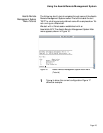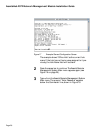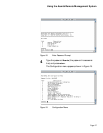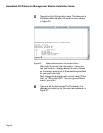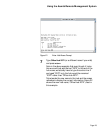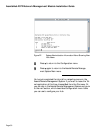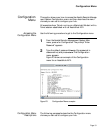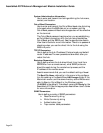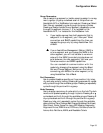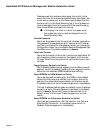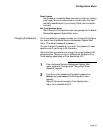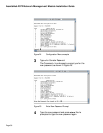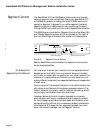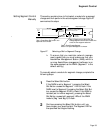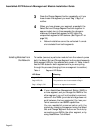
Page 33
Configuration Menu
Group Parameters
Use to assign to a segment or isolate, meaning assign to no seg-
ment, a group. (A group is defined as all of the ports on an
AsantéHub
2072 or NetStacker hub module.) Pressing n (Select
Next Group) repeatedly cycles through the group choices.
Pressing
s (Assign/Isolate Group Segment) repeatedly cycles
through the segment choices—1, 2, or Isolated for the
AsantéHub
2072; 1 or Isolated for the NetStacker hub.
∆ If you isolate a group from both segments (that is,
assigned it to no segment), you’ll lose your Telnet
connection and SNMP capabilities. You then can
manage the group only by using AsantéView Out-
of-Band.
▲ If your AsantéView Management Station (AMS) is
on one segment, and you change the NMM to the
other segment, you will not be able to communi-
cate with the NMM (provided a bridge does not
exist between the two segments). You lose your
Telnet connection and SNMP capabilities.
You can reestablish communication with the
module by changing the segment using the Select
Slot and Change Segment buttons on the hub, by
connecting your AMS to the other segment, or by
using AsantéView Out-of-Band.
Port Parameters
Use to enable/disable a specific port’s connection, link integ-
rity, and auto polarity testing. Pressing
N (uppercase N) repeat-
edly cycles through the available groups. Pressing
n repeatedly
cycles through the ports within a group.
Node Summary
Use to display a summary of node activity on the hub. The hub
monitors all packets passing through its ports. Pressing
G or g
cycles back and forth through the available groups. Pressing
P
or
p cycles back and forth through the ports within a group.
Pressing
c (chg cntr) repeatedly cycles through the available
data counters: Good Frames, Bad Frames, Broadcast, Multicast,
Short Event, Runts, Frame Too Long, SFD Missing, Fragments,
Alignment Errors, DRM Errors, IFG Errors, Collisions, Late Col-
lisions, Auto Partitions, MJLPs, and Readable Octets.



